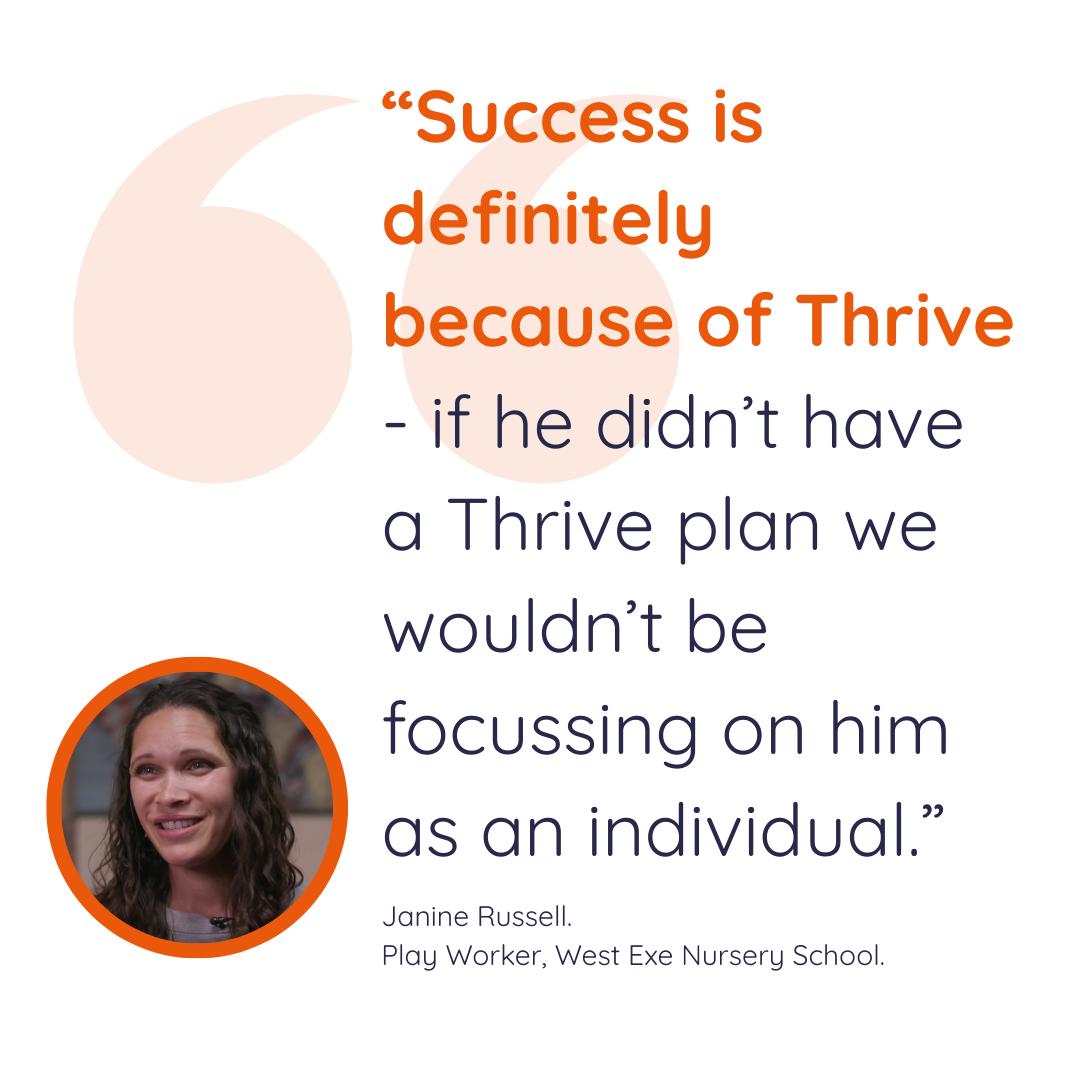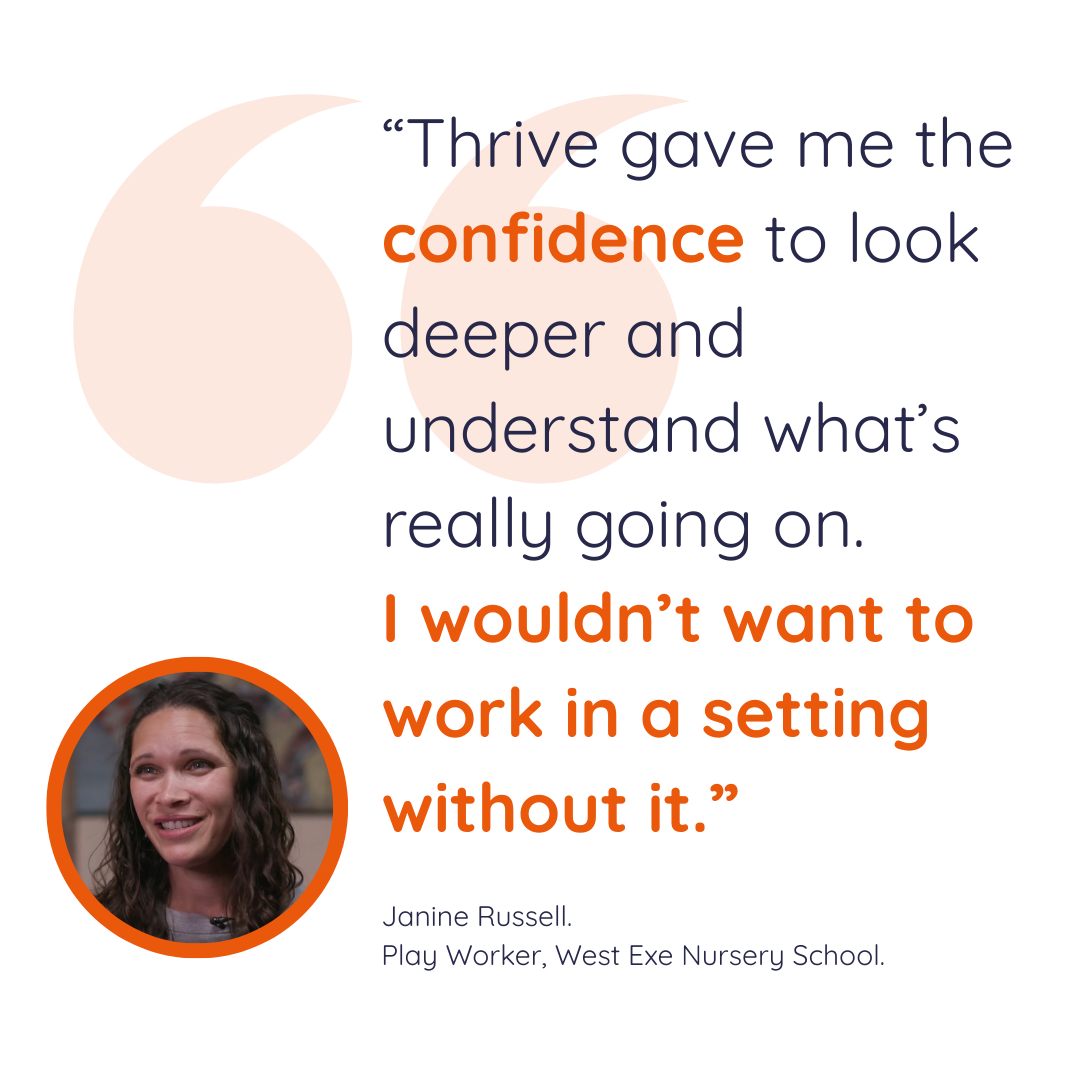Nursery Play Worker, Janine Russell, shares how the Thrive Approach helped one child grow in confidence, build friendships, and feel ready for school, while also creating a more supportive, connected environment across West Exe Nursery School.
The idea of “school readiness” has been in the spotlight recently, with the Government’s Best Start in Life Strategy setting a target for 75% of children to be “school ready” by 2028, alongside new tools for measuring development and plans to strengthen the early years workforce.
For many practitioners, this focus underlines what they already know – that the earliest years are critical for laying the foundations for lifelong learning, wellbeing and confidence. But, readiness isn’t just about holding a pencil or counting to ten – it’s also about feeling confident, managing emotions, and being able to cope with change, just as George (name changed) was supported to do.
Meeting George
When George joined West Exe Nursery School at two years old, he had additional needs and faced challenges with communication, social interaction and play. He struggled to make eye contact, found group time overwhelming and rarely engaged with other children.Janine said: “Sometimes what’s labelled as ‘bad behaviour’ is actually a child asking for help. Thrive gave me the confidence to look deeper and understand what’s really going on.”
A personalised plan
Working closely with George’s parents and the local authority, Janine created a personalised Thrive programme for George. Evidence-based strategies and targeted one-to-one time were used to help him develop confidence, relationships and communication skills.
At first, George still found group time tricky. But introducing another child into some of the one-to-one sessions helped him learn to share, build friendships and feel part of the group.
From hesitant to confident
Over time, George began making his own choices - joining activities, spending time with friends, and even taking himself off to draw when he wanted quiet time. He started to understand right and wrong, make positive decisions, and approach group time with enthusiasm.
For his parents, the change was transformational. Where they once worried about whether George would be ready for school, they now feel confident and proud of how far he has come.
Janine said: “Without a Thrive plan, we couldn’t have focused so much on George as an individual. Now, he’s ready for school and excited about it.”

Why this matters for early years settings
The Best Start in Life Strategy makes it clear that early years practitioners are central to improving outcomes for children. By investing in the workforce – through qualifications, training and professional development – we can give more children the same kind of individualised, emotionally-attuned support that George received.
If you want to learn more about the Thrive Approach, a great first step is our new levy-funded Thrive Early Years Educator Apprenticeship Level 3. It offers all the benefits of a standard Early Years Educator programme, along with a foundational understanding of social and emotional development. The apprenticeship helps practitioners gain the confidence and insight to better understand children’s behaviour, respond effectively, and create supportive early years environments where every child can begin to thrive.
Join us for our FREE webinar exploring how communication, SEND and behaviour connect in the early years
We're connecting online between 4:00pm and 4:45pm BST on 15th September, for an exploratory fireside conversation to unpack the connections between communication, SEND and what we often label as 'behaviour' in early years settings.
Pass it on
Small actions can lead to a big ripple effect. If you enjoyed this post or found it helpful, please consider supporting us in our mission to help every child and young person feel safe, supported and ready to learn by sharing it using the social media buttons below.
Want to join a like-minded community of senior leaders and classroom staff benefitting from insights and strategies to improve attendance, behaviour and attainment? Add your email address below. (It’s easy to unsubscribe).


_680.jpg)
_680.jpg)


_680.jpg)